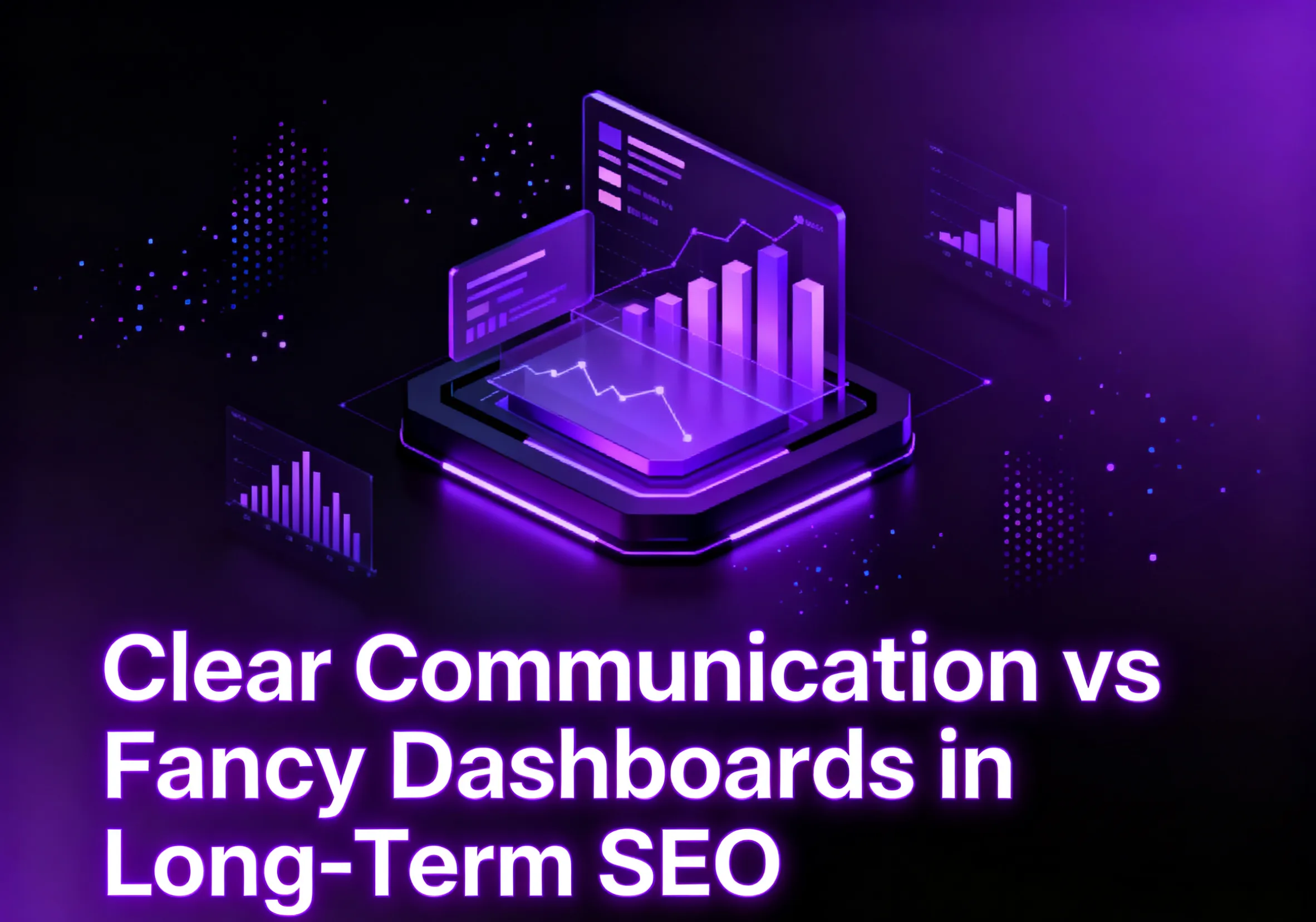Why Clear Communication Beats Fancy Dashboards in Long-Term SEO

You’ve probably seen them: slick dashboards, live rank trackers, colourful graphs updating in real time. They look impressive—and they have their place—but if you’ve ever felt confused about what’s actually happening with your SEO, you’re not alone. The truth is, all the data in the world doesn’t matter if no one explains what it means or what to do next. In this article, we’ll look at why clarity, not tech, is the real driver of successful SEO partnerships over time.
How reporting tools have outpaced actual strategy conversations
It’s easy to be impressed by SEO dashboards. The graphs move, the colours shift, and the numbers look important. But after the first couple of reports, something tends to happen: you stop opening them. Not because you don’t care, but because you’re not sure what you’re meant to be taking away from them. Are things going well? Is that ranking good or bad? Is this up or down compared to what matters?
The real problem isn’t the tool—it’s the lack of context. When an agency sends a report without taking the time to explain it, they’re handing you data, not answers. That might seem fine at first. But as campaigns stretch into months, your team starts asking, “What exactly are we doing again?” If no one’s keeping that strategy alive through regular conversation, the reports just become a monthly ritual with no clear outcome.
This is where communication becomes the differentiator. The best results don’t come from fancier graphs. They come from honest discussions about what’s working, what’s not, and what changes next.
Why businesses disconnect from SEO after a few months
In the beginning, it’s all energy and optimism. You’ve invested in SEO, your team’s on board, and there’s a sense of momentum. But a few months in, something shifts. Meetings get rescheduled. The reports feel repetitive. And slowly, the excitement fades into background noise.
Most of the time, this drop-off isn’t because the strategy failed. It’s because communication did.
SEO is slow by nature. That makes trust essential—and trust comes from clarity, not dashboards. When updates are vague or overly technical, business owners tune out. They stop asking questions, not because they don’t care, but because they feel out of the loop. And when that happens, strategy turns into guesswork.
Context is everything, especially in local campaigns. With Perth SEO services, for example, what matters most isn’t just page-one rankings. It’s local visibility. Relevance to nearby suburbs. Competitor shifts in the area. If no one’s explaining why certain terms are being targeted, or how traffic connects to actual leads, the value of the work gets lost—no matter how strong the performance.
What clear communication looks like in a working SEO relationship
It’s not about sitting through more meetings. It’s about having the right conversations at the right time. Good SEO communication means you’re never left guessing. You know what your agency worked on last month, what they’re focusing on now, and why. More importantly, you can see how it ties back to your business goals, not just your rankings.
You shouldn’t need a digital marketing background to understand what’s happening. If blog content is being written, you should know what topics are being covered and how they connect to what your audience is searching for. If a technical audit was done, you should hear what changed—not just that “issues were resolved.” This kind of communication builds confidence. It also gives you the space to raise your own priorities—whether that’s an upcoming campaign, a seasonal service focus, or a change in how your team is positioned.
Clear communication keeps strategy from going stale. It turns a once-a-month report into a working partnership. When you understand what your SEO team is doing and why, you stay engaged. That’s when campaigns stay on track for the long haul.
How better communication leads to better SEO decisions
When communication is strong, SEO stops feeling like a black box. Instead of waiting passively for results, you’re actively shaping the direction. You can flag changes in your business—like new product lines, updated services, or team movements—that affect how your site should be optimised. Those details matter, and they rarely show up in analytics tools.
Good agencies ask questions that go beyond traffic and rankings. They want to know what’s happening on the ground. Are certain types of enquiries dropping off? Has your sales team noticed a shift in customer behaviour? Are there internal changes that might affect your service areas? These are the kinds of inputs that make SEO responsive, not robotic.
The reverse is also true. Without that flow of information, strategies go stale. Old pages keep getting promoted. Blogs miss the mark. Campaigns lag behind the business. But when there’s an open line of communication, SEO becomes smarter—faster to adapt, more aligned with your goals, and better at generating results that actually matter.
If the reports make you feel smarter, not clearer, that’s a red flag
Some reports are built to impress. They’re full of charts, jargon, and acronyms—enough to feel important, but not enough to actually help you make decisions. If you find yourself reading the same template each month and still not knowing whether things are improving, that’s a problem. And it’s more common than most business owners realise.
Real clarity doesn’t need technical language. It should feel like a conversation, not a performance. You should be able to ask questions without needing a background in digital marketing. The best agencies will explain things in the same way they’d explain them to a colleague. No smoke, no mirrors—just what’s working, what needs to shift, and what the next step looks like.
Over time, that kind of transparency builds better outcomes. It keeps strategy grounded in your real-world goals instead of vanity metrics. And it makes sure that SEO remains a living, evolving part of your marketing—not a mystery you check in on once a month.
